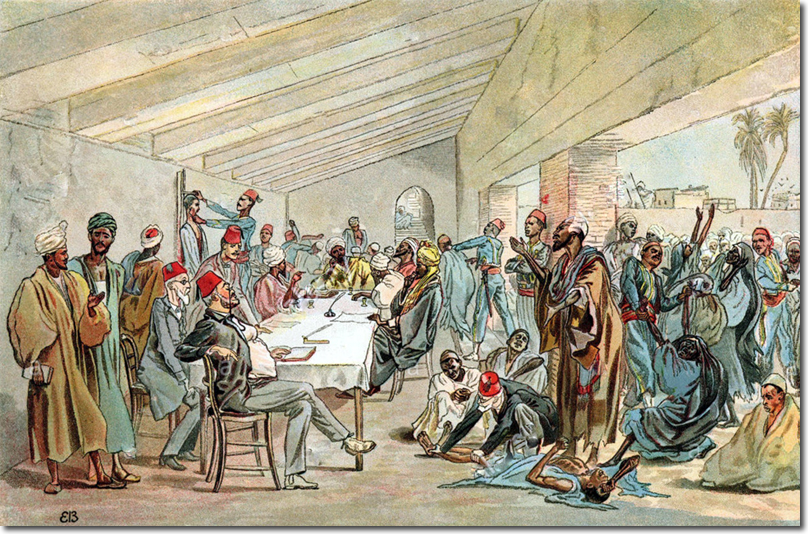|
|

 |
| Registering Fellaheen For The Conscription was by Elizabeth Butler after visiting Egypt in the mid 1880s. She referred to this subject matter in her From Sketch-Book And Diary about her travels in Egypt. She wrote:
"One very saddening glimpse of fellah life was afforded Mrs. C—— and myself at Luxor by the English Consul (a negro), who arranged that we should see the registering of the young fellaheen for the conscription. I think the British have changed all this lately, so we were lucky in seeing a bit of the vanishing Past—a remnant of the Oriental Past which no one can regret. We worked our way, led by the Consul, through the Arab crowd in the village till we came to the entrance of the courtyard where the drama was about to open. At the gate was a scuffling mass of indescribably hideous old hags—the mothers and aunts and grannies of the young fellahs inside, wailing and jerking out their lamentations with marionette-like action of their shrivelled arms. As though by one accord they would stop dead for a minute and look at each other, and then all together begin again the skeleton chorus, throwing dust on their heads. The unsavoury group came in with us pell-mell when the gate was opened, and we found ourselves hoisted rather than conducted to a divan prepared for us under a shed, from whence we could see all that passed. Three Circassian inspectors, looking horrid in European clothes, were at the head of a long rickety table, covered with a white cloth, in front of us. This white cloth, in combination with the surging groups, made a wonderfully good blank space in the composition of what I thought would make a striking picture. The sketch I insert here is in no particular arranged by me, but everything is exactly as I saw it. I noted everything down in my sketch-book on the spot. The sheiks, stately men in silken robes, who had brought each his quota of recruits from his district, sat chatting over their coffee at the farther end of the table, and the doctor at once set to to examine the miserable youths that came up for registration. Fathers pleaded exemption for their sons on one pretext or another, such as leprous heads, blindness, weak chests, and so forth; the mothers, aunts, and grannies aforesaid went on jibbering and clacking their jaws in the background, no one paying the least attention to them. If a fellah was passed by the doctor a gendarme gripped him and pummelled him all the way to the standard, where he was measured. If satisfactory, the woe-begone creature received a sounding box on the ear, just in fun, from the gendarme, and was shoved into the pen where the successful (!) candidates were interned; if he was below the mark, all the same he got his blow, and was pushed and cuffed back to his friends and relatives. One mother had crept forward while her son was having his lanky leg straightened by the doctor, the father pleading the boy’s lameness (Erckmann-Chatrian’s Conscript orientalised!): a gendarme sprang forward and knocked her down, then hauled her off by her arms, which were so very thin and suggestive of a mummy that I could not look any longer; he was so rough I really thought he would pull them out of their sockets. My friend was crying, and if I had not been so concentrated on my pencil notes I should have cried too. “Surely,” she said, “that can’t be his mother, she looks a hundred at least.” “A hundred!” I exclaimed, “she is four thousand years old—a mummy!” I felt very sick as well as sorry. We were politely offered coffee in jewelled cups, which we could not taste, and surreptitiously emptied behind the divan. The English have worked wonders since those days with the Egyptian army. Taking the young men in the right way our officers have turned them into remarkably smart-looking soldiers, and their terror of the service, I am told, has vanished." |
Elizabeth Butler Artist of Empire Article | Lady Butler Biography
Armed Forces | Art and Culture | Articles | Biographies | Colonies | Discussion | Glossary | Home | Library | Links | Map Room | Sources and Media | Science and Technology | Search | Student Zone | Timelines | TV & Film | Wargames